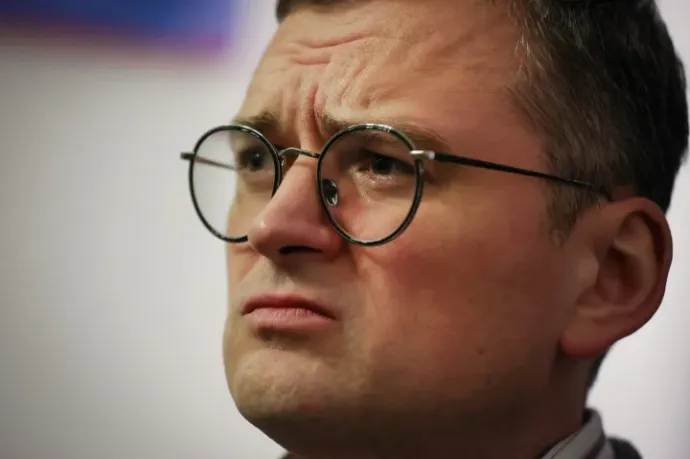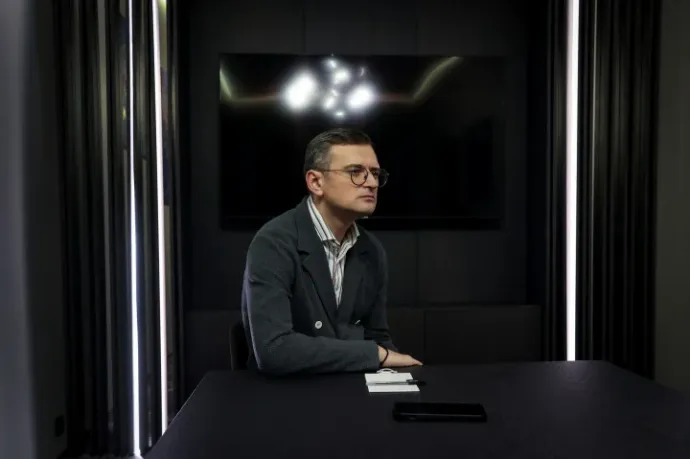Dmytro Kuleba to Telex: All problems in the relationship between Hungary and Ukraine can be traced back to the Russian aggression

In his interview with Telex following his talks with the Hungarian Foreign Minister in Uzhhorod, Ukrainian Foreign Minister Dmytro Kuleba said that he considers it important that Péter Szijjártó stressed his support for Ukraine's territorial integrity and sovereignty. He believes that Ukraine's EU membership is in line with Hungary's strategic interests in terms of security policy, the economy and the Hungarian minority. They also discussed how Ukraine could cooperate with the Hungarian oil giant MOL, taking into account Hungarian energy interests. Referring to a statement by László Toroczkai, (the leader of the Hungarian far right party, Mi Hazánk) who recently laid claim to the Ukrainian region of Transcarpathia, he said that radical statements from either side should not be allowed to disrupt bilateral relations. He considers Viktor Orbán and Péter Szijjártó to be pro-Hungarian, not pro-Russian.
When the agreement on the shipment of grain was reached with Russia during the Russian naval blockade of the Black Sea, you said you would celebrate with a cigar. Do you have a reason for celebrating today, following your talks with Hungarian Foreign Minister Péter Szijjártó?
I smoked a cigar just before the interview. I always light up whenever I have a good reason to do so, and today we had a very good, very open and sincere conversation. We managed to dispel any doubts that existed in our relationship.
Péter Szijjártó reported a threat made against him before this trip.
Yes, and we were of course made aware of this. We also learned that a politician in Hungary, I cannot remember his name, said that if Ukraine should fall apart, he will announce his claim to Transcarpathia. (Here, Kuleba was referring to the leader of the far right party Mi Hazánk, László Toroczkai. The Ukrainian FM was later quoted by the Ukrainian news agency Unian on the matter as follows: “We understand that not everyone wants a good relationship between Ukraine and Hungary…But I would like to say that if Putin came a cropper in Ukraine, then some Hungarian politicians who make such statements will do so even more.” – ed.)These kinds of radical statements are present on both sides. Every country has its own domestic political reality, there are various statements made in each country, but we cannot allow them to disrupt our bilateral relations.
Did Péter Szijjártó say anything you have not heard from him before?
This was the first time he said that the changes adopted in the law on minorities have stopped the negative spiral that has characterized Ukrainian-Hungarian relations in recent years. It was also important that he emphasized his support for Ukraine's territorial integrity and sovereignty.
Don't you see a contradiction between the statement of support for territorial integrity and sovereignty and the Hungarian government's view that Western arms supplies are only prolonging the war and that negotiations with Russia are necessary?
There are differences of opinion on how to achieve peace, but we agree on the importance of Ukraine's territorial integrity and sovereignty.
All the while, according to Péter Szijjártó, the solution will not be found on the battlefield, there is nothing but destruction there, which is why in the spirit of peace, there should be negotiations with Russia.
We do have a different view on this indeed: we believe that Russia can only be forced into meaningful negotiations based on the results achieved on the battlefield. If we were to sit down at the negotiating table without this, Russia would only be buying time, which it would use to prepare itself for continuing the fight with even greater vigor.
The statements of both Viktor Orbán and Péter Szijjártó have been labeled as pro-Russian in the West and in Ukraine as well. Do you agree with this label?
If such a thing were to be confirmed, it would represent a major problem for both the EU and for Hungary. But I think they are pro-Hungarian. If they were pro-Russian, Péter would not have declared at today’s meeting that he respects Ukraine's territorial integrity and sovereignty.

At the press conference, Péter Szijjártó was asked whether he supports Ukraine's accession to the EU. His response was that "We have a lot of ongoing discussions in Brussels about what the EU should look like in the future. These debates are necessary, so that we can make an informed decision" Did you interpret that as a yes?
I did. Hungary has its own complicated relationship with the EU. I told Péter: Look, you are part of this big European family, and we would like to be part of it too. But the disputes that you have among yourselves should not affect our relationship with each other.
It is clear that Ukraine's membership in the EU is in line with Hungary's strategic interests, from a security policy perspective, from an economic perspective, as well as from the perspective of the Hungarians in Ukraine. The fact that Péter could not say more than he did at the press conference in this regard is probably due to reasons of domestic politics. But I am sure he is aware of the importance of our EU membership.
And what about Ukraine's prospective membership in NATO?
The Ukrainian side has expressed its position on NATO membership, and the Hungarian side has not commented. But it is important that back in 2017, Hungary, and Viktor Orbán personally, was explicitly supportive of Ukraine's NATO membership. Why the Foreign Minister has not commented on this now is a question for him, but it is much more important, and I would like to emphasize this point, that Hungary is not blocking the rapprochement, and has been participating in the newly formed Ukraine-NATO discussions that are under way.
According to the Hungarian government, the sanctions against Russia have not brought any results.
The sanctions against Russia are working, they are having an effect. However, if we do not close the loopholes which allow the sanctions to be circumvented, they will indeed have less effect. I would note that, regardless of what the Hungarian government has said, in the end, it has supported all thirteen sanctions packages. And these are quite painful for Russia.
At the same time, it is no secret that Budapest and Kyiv have very different views on the Russian nuclear industry. And by this I mean the possibility of sanctions against Rosatom, which provides significant revenues to the Russian budget. While Hungary does not see an alternative to Rosatom, we do.
And is there an alternative to Russian oil? Szijjártó expressed his gratitude that transit through Ukraine has continued unhindered.
The thing about the oil pipeline is that there are no alternative oil transport routes towards Hungary and Central Europe in general. A solution for this must be found, and dependence on Russian oil must be gradually abandoned.
Do you see any such Hungarian intentions?
We have touched on this subject today, and we discussed how Ukraine could cooperate with MOL, while taking into account Hungarian energy interests.
What does this mean?
I cannot say more about that, but we explained our position in the meeting. I think it is in Hungary's interest not to depend on any single source, wherever that source may be.

Since the law on minorities has been amended, the focus of the Hungarian Government's objections seems to have shifted to corruption in Ukraine in general.
No objections to corruption were raised during our talks today. On the other hand, it's been expressed that both sides need to approach problematic issues in good faith, and we are working on that.
Why didn't Ukraine amend the minority law years ago? It could have prevented the disputes.
Both Ukraine and Hungary have a distinct domestic political situation. Just as in Hungary there are political forces that make anti-Ukrainian statements in Hungary, at that time there were political forces in Ukraine that wanted to enact the law in the form in which it was enacted. But let us not forget one thing: Péter Szijjártó said that the disputes started in 2015. Indeed, this was a direct consequence of the events of 2014, when Russia attacked Ukraine on the pretext that it had to protect the Russian-speaking population.
After that, Ukrainian society became very sensitive to the question of language and its political use. So, in effect, the disputes we are having in Hungarian-Ukrainian relations and the problems that we are trying to solve are actually the consequences of Russian aggression. But we are now on the path towards resolving these.
Has Ukraine received any more specific information about the downing of the Il-76 aircraft, which crashed – or was destroyed – over Russia? Is there evidence that there were indeed 65 Ukrainian prisoners of war aboard the plane?
We still do not know for sure. In any case, it is certainly curious that only five bodies were removed from the site. How is it possible that they were preserved and the other bodies were all incinerated? Despite this, negotiations have not broken down and Ukraine is continuing to work on prisoner exchanges.
For more quick, accurate and impartial news from and about Hungary, subscribe to the Telex English newsletter!